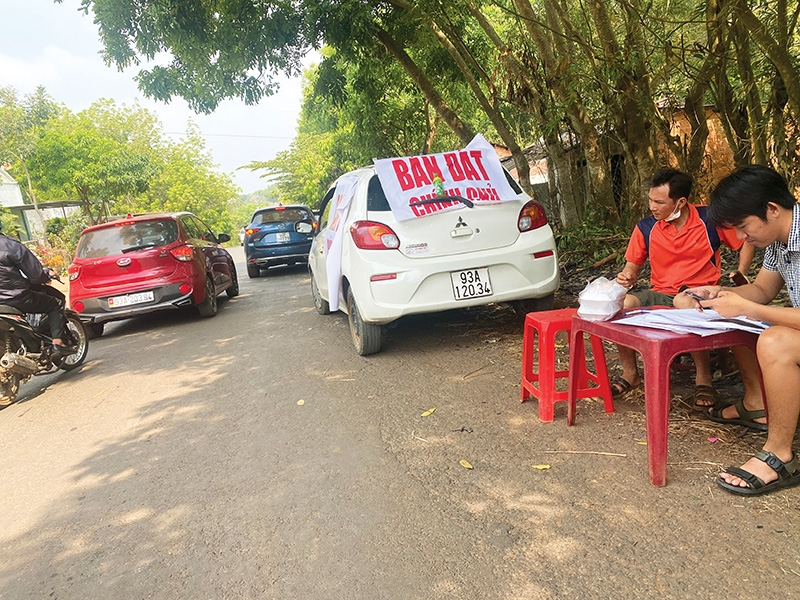Outskirts developing chances taking a hit with land frenzy
 |
| Land brokers and sellers show legal documents and certificates of land plots for sale, Photo: Le Toan |
Recent land price hikes have been witnessed in Binh Phuoc province of up to 100 per cent between February 25 and March 10. Tay Ninh province saw hikes of 40 per cent, Can Gio district 100 per cent, and the north-west of Ho Chi Minh City at 30 per cent compared to the last quarter of 2020.
A leader of a domestic property developer expressed worry after her company quit from a proposed project in Tay Ninh province, due to the land price in this area having increased four times compared to 2019.
“If we proceeded, we would lose out for sure,” she said. “Land price hikes impact investment expenditure. We do not expect it can be increased four times later to recover the expenses.”
Le Hoang Chau, chairman of the Ho Chi Minh City Real Estate Association, said that the land price increase will create a domino effect for local authorities, landlords, and local tenants and buyers as well.
“Illegal brokers will utilise this price hike and push the price more to grab higher profits. The price hike will also certainly discourage both domestic and international developers who want to invest in those areas,” Chau said.
One of the more recent issues for the land price is that local authorities have proposed to the government to set up new airports in their province, and some cities and provinces have even proposed a second airport.
A fortnight ago, although an airport project has only been proposed in Hon Quan district of Binh Phuoc province and is still being considered by the competent agencies, a large number of land brokers rushed to the district and inflated the prices of land lots in surrounding areas.
Brokers from Ho Chi Minh City and Hanoi and the neighbouring localities of Binh Phuoc flocked to take action. An official from local authorities told VIR that land price inflation poses a high risk for buyers.
“The price inflation may encourage local residents, especially the ethnic minority people, to sell agricultural land – the only way of getting income for them,” said the source.
Local authorities had to send police to these areas and confirmed that the proposal of a new airport was not yet planned, eventually helping to encourage people to stand down.
Another reason for land hikes has been the merger or potential merger of districts or newly-established administrative units in the city.
Price rises already reported in the newly-established Thu Duc city of Ho Chi Minh City fuelled similar fever in the city’s Hoc Mon and Cu Chi districts – the location of a recent proposal to merge the two into a so-called “NorthWest city”.
Brokers and land hunters also flocked to these areas with a wish to be the first buyers in this wave. However, local authorities insisted that the establishment of a NorthWest city was simply an idea for now, with no detailed plan set up or officially proposed to Ho Chi Minh City People’s Committee.
Moreover, with the current infrastructure and population density, setting up such a city could take decades, according to a local officer at the People’s Committee of Hoc Mon district.
Back in Binh Phuoc province, Su Ngoc Khuong, senior investment director at Savills, said that if a new airport was realised, it would be not the magic bullet to transform the province’s economy and property market, as other factors would have to come into play. If the airport is approved it would also need 5-10 years before going into operation and creating added value for the local community.
Khuong added that the current land fever is characterised by unclear information about proposals to build important infrastructure projects. “Transactions can be mainly transferred directly one-on-one and without official confirmation from local authorities. Most of those traders are not end-users but they expect profit by transferring land lots only,” Khuong said.
To limit speculation, Nguyen Van Dinh, vice chairman of the Vietnam Association of Realtors, said that the government should control the trading activities of local trading floors and amateur brokers. Under the current law, official brokers must have certificates when they are trading properties; however in those localities, every cafeteria or household owner can be a broker. “Moreover, local authorities also have to publicise the information on incoming projects so that buyers can avoid fake products advertised in the market,” Dinh said.
Nguyen Hoang, director for research and development of DKRA Vietnam, said that investors must be careful with fevered activities. “Following buyers will bear a high risk because they can be the losers, especially buyers who have to take loans from financial institutions to buy that land,” Hoang said.
What the stars mean:
★ Poor ★ ★ Promising ★★★ Good ★★★★ Very good ★★★★★ Exceptional
Related Contents
Latest News
More News
- VNPAY and NAPAS deepen cooperation on digital payments (February 11, 2026 | 18:21)
- Vietnam financial markets on the rise amid tailwinds (February 11, 2026 | 11:41)
- New tax incentives to benefit startups and SMEs (February 09, 2026 | 17:27)
- VIFC launches aviation finance hub to tap regional market growth (February 06, 2026 | 13:27)
- Vietnam records solid FDI performance in January (February 05, 2026 | 17:11)
- Manufacturing growth remains solid in early 2026 (February 02, 2026 | 15:28)
- EU and Vietnam elevate relations to a comprehensive strategic partnership (January 29, 2026 | 15:22)
- Vietnam to lead trade growth in ASEAN (January 29, 2026 | 15:08)
- Japanese business outlook in Vietnam turns more optimistic (January 28, 2026 | 09:54)
- Foreign leaders extend congratulations to Party General Secretary To Lam (January 25, 2026 | 10:01)

 Tag:
Tag:




















 Mobile Version
Mobile Version